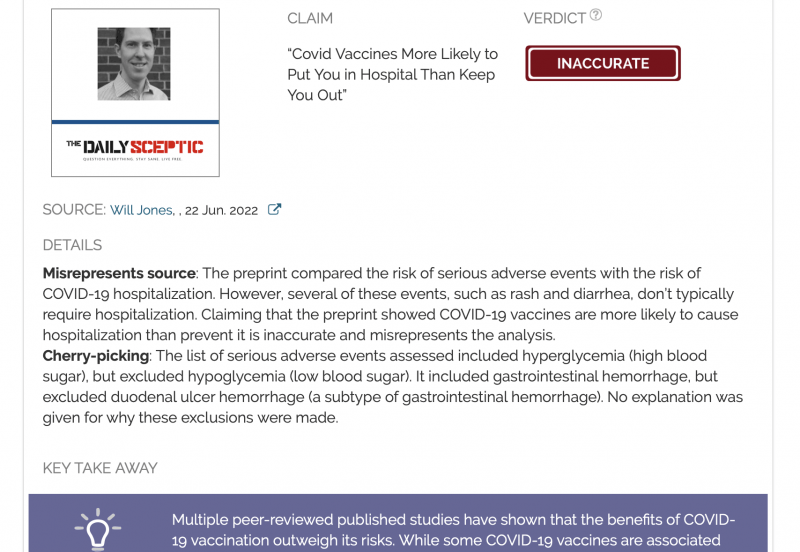nonethewiser
Well-Known Member
- Relationship to Diabetes
- Type 1
I'd normally agree with that, but.....what booster number are we onto now?
Will be getting 5th soon & hopefully more if virus stays around.
I'd normally agree with that, but.....what booster number are we onto now?
There've been a couple of what seem to me to be careful criticisms of this preprint: https://respectfulinsolence.com/2022/06/29/peter-doshi-vs-covid-19-vaccines-the-latest-round/New paper from editor of the British Medical Journal on trials.
The excess risk of serious adverse events of special interest surpassed the risk reduction for COVID-19 hospitalization relative to the placebo group in both Pfizer and Moderna trials (2.3 and 6.4 per 10,000 participants, respectively).

Serious Adverse Events of Special Interest Following mRNA Vaccination in Randomized Trials
Introduction: In 2020, prior to COVID-19 vaccine rollout, the Coalition for Epidemic Preparedness Innovations and Brighton Collaboration created a priority listpapers.ssrn.com

As I understand it the consensus is that these are really safe vaccines, and there's no significant risk in having extra doses. Also, it seems generally accepted that it's sensible to regard three doses as the normal series (so our first "booster" probably should just be regarded as the third dose).I'd normally agree with that, but.....what booster number are we onto now?
It's not "in the BMJ". It's a preprint, and one author is an editor at the BMJ.The paper in the BMJ said this
Absolutely, but (as the criticisms say, and as I commented) this was during the trial when prevalence wasn't all that high.I'd assume any doctor would assess the risk/reward of precribing any medicine based on the presenting illness.
For India I suspect money is a big part of it, yes. Not just the money they'd need to pay to Pfizer, but the money they'd need to spend on the infrastructure to deliver the vaccine. Probably doable in cities, but would be more challenging outside.Its all about the money.
In that case it's much too late. Even if we believe it makes sense (and I don't, for the reasons given) that's long ago. We have much better experience of how the vaccines work now.The paper (by the BMJ chap) (and this thread) is about the trials, which is the basis for the emergency use authorisation.
Could be, or maybe that was at least partly leverage: if you manufacture it in India (or teach us how to) maybe we can do a deal.It seems it was also about giving indemnity to the manufacturers, which India didn't want to do.
Sure, but there's no need to rely on it: recovery from infection can give you good protection (though it may not, and there's some signs that recovery from Omicron doesn't give such good protection), but recovery from infection followed (a few months later) by vaccination is vastly better. So people should get vaccinated.We also know how well our innate/acquired immune system works too. If one has had covid, this changes the context too of the risk vs reward.
They do not. (I'm not aware of any vaccines that do.)These vaccines, from what I understand, do not prevent infection, hence why UK hospitals are now bringing back masks and social distancing.
No! Vaccination after recovery produces better protection. And the risks of vaccination are really low.Thus, getting vaccinated when previously having had covid would be an unnecessary risk?
"The excess risk of serious adverse events of special interest surpassed the risk reduction for COVID-19 hospitalization relative to the placebo group in both Pfizer and Moderna trials (2.3 and 6.4 per 10,000 participants, respectively)."
What would be the basis for recommending a vaccine for those who had already had covid given the above statement?
Yes, I'd say the first part of his statement isn't true except short term (for 3-6 months after the last dose). However, given that the vaccines do reduce the severity of infection (and the length) I think it's true that they reduce transmission. I think there are some studies looking at how much they reduce transmission but I don't remember the results.So Tim Spectors statement on This Morning with Dermot O'Leary last year can't of been true?
"Vaccines are very effective at both stopping you getting the virus and also reducing the amount of virus that you get so that it's much harder to transmit it in those "few" people that do get it once they've been vaccinated".
As opposed to the guest prior to Tim (Bev Turner) who said "it does not stop you catching or passing on the virus".
So it appears. Still looks useless to me for all the reasons the preprint does.This paper now appears to have been peer reviewed and published?
Alternatively, the mRNA vaccines are vaccines. We just had too specific definitions (now extended to cover them). And (most likely in my opinion) they're as safe as they seem and the technology will be used for other vaccines including for some which seemed not practical before.Its not a vaccine, it does not fit the scientific definition of one. There is big trouble ahead with this.
